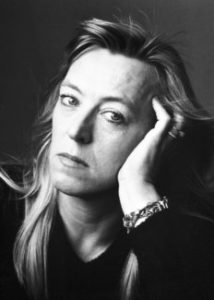
Jody Williams
The 1997 Nobel Peace Prize was jointly awarded to Jody Williams (of Vermont, US) and the International Campaign to Ban Landmines (ICBL).
Landmines are the scourge of poor countries. 100 million un-detonated anti-personnel mines still remain buried in 60 countries after wars and armed conflicts. Their original purpose was to maim or kill enemy soldiers in war, but it is the civilian population that suffers (and continues to suffer) most. In addition, there are between one and two hundred million mines in stockpiles around the world. Each year, landmines injure more than 25,000 people.
In her Nobel Lecture, Jody Williams said, “How is the landmine different from any other conventional weapon? Landmines distinguish themselves because once they have been sown, once the soldier walks away from the weapon, the landmine cannot tell the difference between a soldier or a civilian – a woman, a child, a grandmother going out to collect firewood to make the family meal. The crux of the problem is that while the use of the weapon might be militarily justifiable during the day of the battle, or even the two weeks of the battle, or maybe even the two months of the battle, once peace is declared the landmine does not recognize that peace. The landmine is eternally prepared to take victims. In common parlance, it is the perfect soldier, the ‘eternal sentry.’ The war ends, the landmine goes on killing.”
When Jody Williams was studying international politics in the 1980s at the Johns Hopkins School of Advanced International Studies in Washington, D.C., she became involved in aid work in war-torn El Salvador. Landmines were a constant threat to the civilian population there, and her task was to provide artificial limbs for children who had lost arms and legs.
Deeply influenced by what she saw in El Salvador and Nicaragua, Jody took on the mission of getting landmines banned everywhere. She was the driving force in the launching of an international campaign against landmines. Initially there was little support for this idea. The International Committee of the Red Cross (ICRC) did press the governments of the world to consider increased restrictions or elimination of particularly injurious or indiscriminate weapons. But the end result of several years of negotiations was the 1980 Convention on Conventional Weapons (CCW), which was just an attempt to regulate (and not ban) the use of landmines.
As relative peace broke out with the end of the Cold War, however, the UN was able to go into those nations that had been torn by internal strife, and what they found when they got there were millions and millions of landmines which affected every aspect of peacekeeping, which affected every aspect of post-conflict reconstruction of those societies.
In October 1992, NGOs such as Handicap International, Human Rights Watch, Medico International, Mines Advisory Group, Physicians for Human Rights and Vietnam Veterans of America Foundation came together to issue a ‘Joint Call to Ban Antipersonnel Landmines.” These organizations became the steering committee of the International Campaign to Ban Landmines (ICBL). Jody was its founding coordinator.
By 1997, thanks to Jody’s strength and organizational talent, ICBL had 1000 organizations from 60 countries on its list of members. The Ottawa Convention, which was signed by 120 states and entered into force in 1999, will always be associated with the names of Jody Williams and the ICBL. It banned the use, production, sale and stock-piling of anti-personnel mines. In addition it contained provisions concerning mine clearance and the obligation to provide humanitarian assistance. It was the world’s small and medium-sized states that got the resolution adopted, strongly supported by the ICBL.
In her capacity as ICBL coordinator, Jody has written and spoken extensively on the problem of landmines and the movement to ban them. She has spoken in various fora, including at the UN, the European Parliament, and the Organization of African Unity. She has also produced reports and papers on the issue.
Jody has received more than a dozen honorary degrees and was named by Forbes magazine in 2004 as one of the 100 most powerful women in the world. She continues to be recognized for her contributions to human rights and global security.
Afterword: Jody’s memoir, My Name Is Jody Williams: A Vermont Girl’s Winding Path to the Nobel Peace Prize, was published in 2013.
